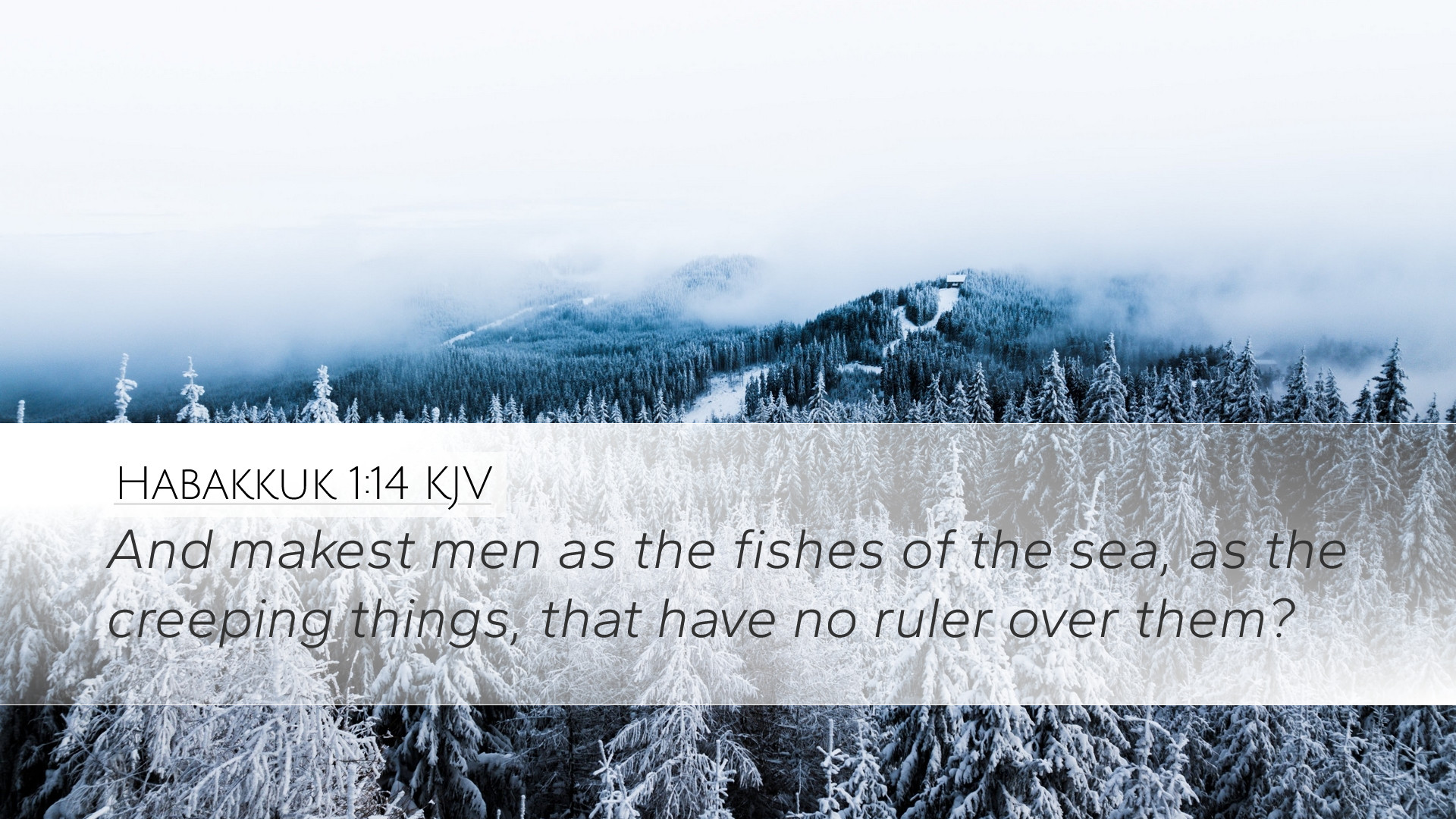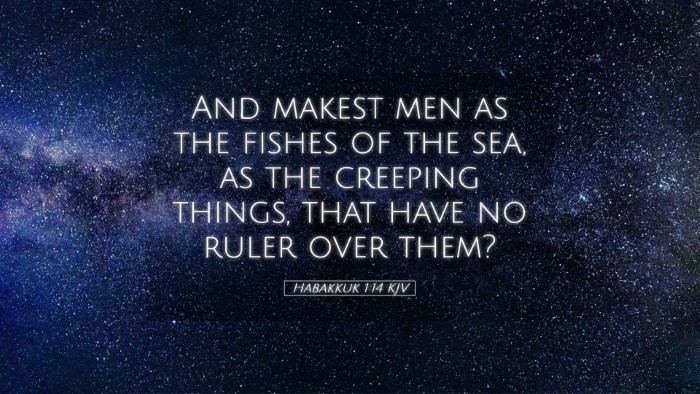Old Testament
Genesis Exodus Leviticus Numbers Deuteronomy Joshua Judges Ruth 1 Samuel 2 Samuel 1 Kings 2 Kings 1 Chronicles 2 Chronicles Ezra Nehemiah Esther Job Psalms Proverbs Ecclesiastes Song of Solomon Isaiah Jeremiah Lamentations Ezekiel Daniel Hosea Joel Amos Obadiah Jonah Micah Nahum Habakkuk Zephaniah Haggai Zechariah MalachiHabakkuk 1:14
Habakkuk 1:14 KJV
And makest men as the fishes of the sea, as the creeping things, that have no ruler over them?
Habakkuk 1:14 Bible Commentary
Commentary on Habakkuk 1:14
Habakkuk 1:14 states:
"And makest men as the fishes of the sea, as the creeping things, that have no ruler over them." (KJV)
Contextual Overview
The book of Habakkuk presents a dialogue between the prophet and God concerning the justice of God amidst the suffering of Israel. The opening chapter introduces Habakkuk’s lamentation over the wrongful acts and violence he observes, questioning God’s silence and apparent inactivity in avenging these injustices. Verse 14 emerges as a pivotal expression of God's creation, drawing an analogy between humans and the chaotic nature of marine life, providing profound theological implications for understanding divine sovereignty and human vulnerability.
Exegetical Insights
- Human Vulnerability: Matthew Henry notes that the comparison of men to fishes suggests a lack of control and order among humanity. Just as fish in the ocean are at the mercy of their environment, so too are people subject to the whims of societal injustices when they stray from God’s guidance.
- Divine Sovereignty: Albert Barnes emphasizes that Habakkuk illustrates the dominion God has over all creation. The imagery of men as creatures without rulers signifies a departure from divine order, highlighting the need for effective leadership grounded in godliness.
- Chaos and Disorder: Adam Clarke reflects on this verse, asserting that the absence of rulers symbolizes moral decadence; without divine authority, societal disorder reigns. This metaphor serves as a critique of human governance devoid of righteousness and wisdom.
Theological Implications
The verse presents significant theological reflections for pastors and theologians, particularly regarding the concepts of leadership and the nature of humanity's relationship with God.
- Leadership and Authority: The absence of a ruler over the fishes parallels the need for just leadership among people. Effective spiritual leadership is vital for maintaining order in society, indicating that true authority must reflect God’s justice.
- The Nature of Humanity: This comparison invites a reflection on human nature's innate proclivity towards chaos in the absence of divine guidance. Habakkuk’s lament is a reminder that without God's intervention, societal structures can devolve into disorder and violence.
- Call for Righteousness: The imagery invites the faithful to long for rulers who embody righteousness, reflecting God’s character. The prayer for reform in leadership resonates with contemporary calls for justice and integrity in governance.
Pastoral Applications
For pastors and church leaders, there are several critical lessons to draw from this verse:
- Understanding Human Desperation: Recognizing the human condition as depicted in this verse encourages ministers to empathize with those who feel lost in chaos and injustice. It emphasizes the necessity of pastoral care in addressing societal issues.
- Advocating for Justice: The call for righteousness among leaders is relevant today, urging pastors to take a stand in the face of injustice, lending their voice to the marginalized, and advocating for leadership that reflects God’s righteousness.
- Nurturing Hope: Despite the chaos described, this verse also serves as a reminder of the hope found in God’s sovereign control. Pastors can reassure their congregations that God is ultimately sovereign over the chaos of human affairs.
Conclusion
In Habakkuk 1:14, the insightful parallel drawn between men and the ungoverned sea creatures presents a profound reflection on humanity's condition. This verse challenges believers to recognize their need for divine order and authority. As they reflect on the implications of this interpretation, they are challenged to seek God’s justice and advocate for godly leadership in every sphere of life.
Through the combined wisdom of public domain commentaries, we find a rich tapestry of thought that encourages deeper contemplation of our spiritual and societal realities.


